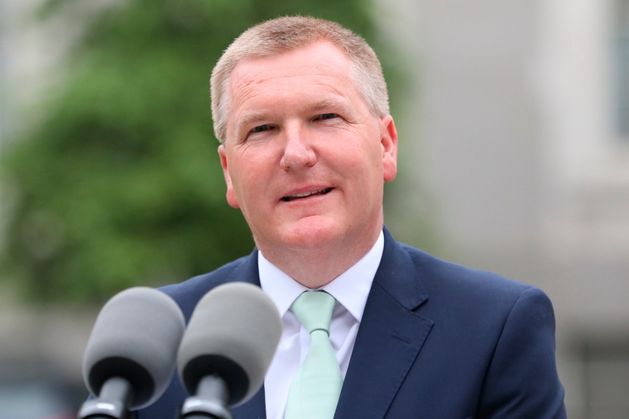


European Commission President Ursula von der Leyen is set to assign jobs in the EU’s executive body on Tuesday, confirming which countries’ representatives will win powerful roles on trade, competition and the green agenda.
Ireland’s EU Commission nominee Michael McGrath had previously admitted a portfolio in the finance or economics areas would best suit his political experience and Ireland’s interests.
The Cork South Central TD was nominated by the Government for a EU Commission post and was replaced in Cabinet earlier this year by new Finance Minister Jack Chambers.
Ms von der Leyen is meeting the leaders of the European Parliament political groups in Strasbourg this morning, and the announcement is due to follow after.
The Commission is the 27-country European Union’s most powerful institution. It has the power to propose new EU laws, block mergers between companies and sign free trade deals.
Each EU member state will have one seat at the Commission’s table, a role comparable to a government minister, although its political weight varies greatly depending on the portfolio.
Among the most powerful are the trade and competition briefs, as well as areas such as energy and the EU internal market, where EU laws substantially impact businesses and consumers across Europe.
The next EU Commission is expected to take office by the end of the year, meaning one of its first tasks will be fielding the outcome of the US presidential election in November.
A second Trump presidency could sharply alter Western unity on supporting Ukraine against Russia’s invasion and up-end EU trade relations with the world’s biggest economy.
Other challenges for the next EU Commission include tackling the ailing competitiveness of European industries as competition hardens with China over manufacturing green technologies like electric cars.
There was some drama on Monday on the next Commission’s line-up, when France picked Foreign Minister Stephane Sejourne as its new candidate after the incumbent, Thierry Breton, abruptly quit with tough words for von der Leyen.
Spain’s Commission candidate, ecological transition minister Teresa Ribera, is in the running for a senior role, according to EU officials.
Poland’s nominee Piotr Serafin is poised for a powerful job overseeing the EU’s budget, while Lithuania’s Andrius Kubilius is tipped to become the EU’s first defence commissioner – a new role designed to build up European military manufacturing capacity in the face of Russian aggression in Europe’s eastern flank.
However, last-minute internal negotiations could reshuffle these jobs.
Complicating the picture is that most EU governments ignored von der Leyen’s request to send both a male and female candidate to achieve a gender-balanced EU executive.
Currently, EU countries have nominated 17 men and 10 women – an improvement from a few weeks ago, but still far short of equal representation.
Each new commissioner will need to pass a hearing in the European Parliament, expected in the coming weeks, in which EU lawmakers will attempt to extract promises from the nominees on what they will deliver if they get the job.
The EU Parliament can block Commission nominees – with Hungary’s Oliver Varhelyi among the candidates EU officials expect to be put under pressure during his hearing.